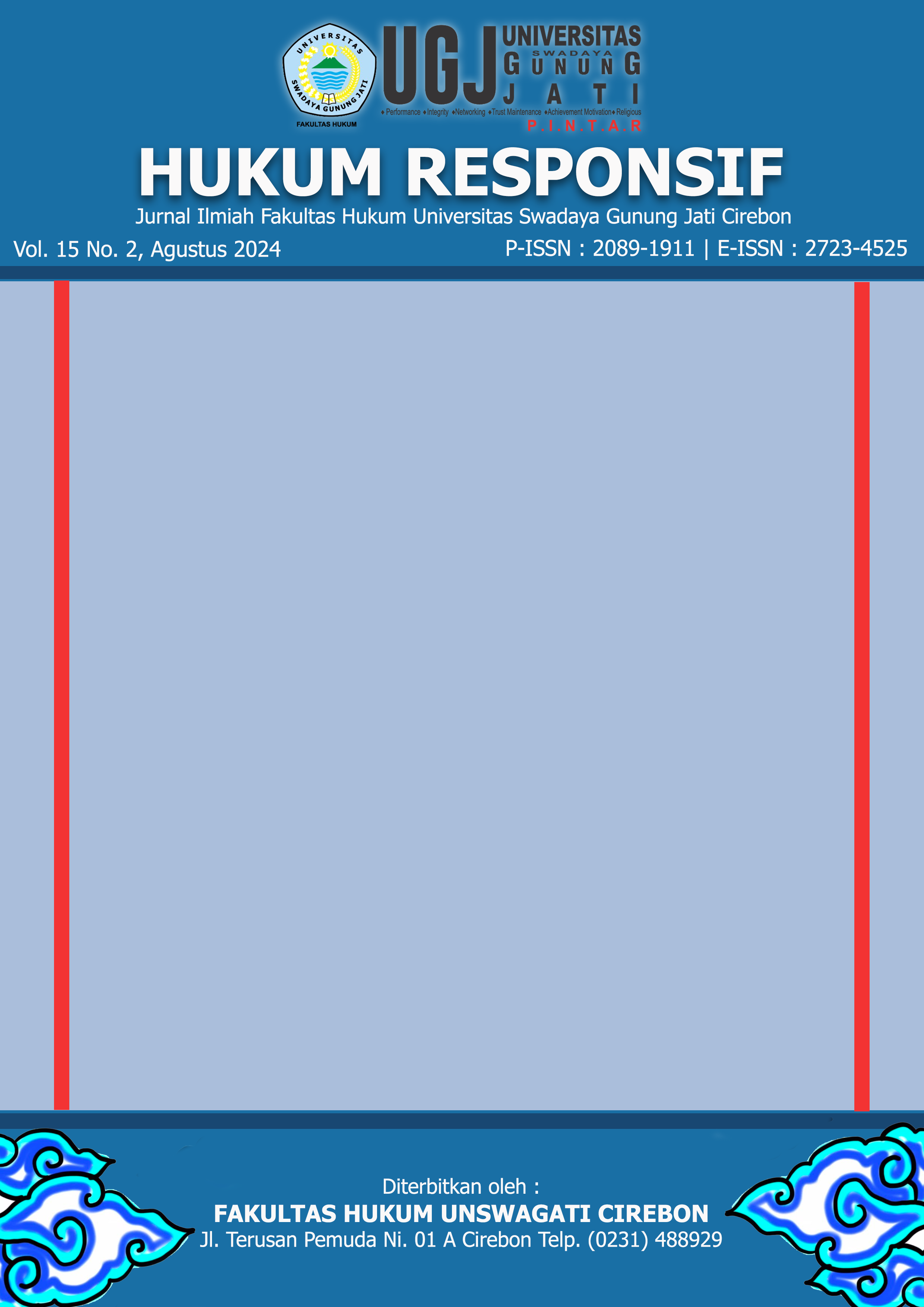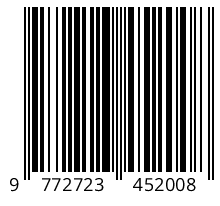THE APPLICATION OF THE PRINCIPLE OF EQUALITY BEFORE THE LAW IS REVIEWED FROM THE IMPLEMENTATION OF CROWD PUNISHMENT DURING THE COVID-19 PANDEMIC (CASE STUDY OF DECISION NUMBER 221/PID. SUS/2021/PN. JKT. TEAM)
DOI:
https://doi.org/10.33603/responsif.v15i2.9849Kata Kunci:
application, Legal Principles of Equality Before The Law, criminal implementation, health protocolsAbstrak
The Covid-19 pandemic has had a significant impact on various aspects of life, including law enforcement in Indonesia. One of the problems that emerged was the application of the legal principle of equality before the law. This study aims to analyze the application of the principle of equality before the law during the Covid-19 pandemic still has weaknesses reviewed from Law Number 6 of 2018 concerning Health Quarantine, by taking a Case Study of Decision Number 221/Pid.Sus/2021/PN. Jkt. Team involving Habib Rizieq Shihab. The research method used is a qualitative approach with the type of case study research. Data were collected through document studies, interviews, and participatory observations. The analysis was carried out using content analysis techniques to identify problems with the effectiveness of law enforcement in cases of crowd crimes during the pandemic. The results of the study show that there is legal uncertainty in the enforcement of crimes against crowd violations during the pandemic. This uncertainty is caused by inconsistencies in the application of the law, lack of transparency in the law enforcement process, and differences in legal interpretation at various levels of court. The case of Habib Rizieq Shihab revealed that there was different treatment in law enforcement, which caused a perception of injustice in society. This study suggests several steps to apply the principle of equality before the law for violators of criminal sanctions. First, consistent and indiscriminate law enforcement is needed to maintain public trust in the legal system. Second, transparency in the law enforcement process must be improved, including the delivery of clear information regarding detention procedures and sanctions given. Third, the government and related institutions need to increase public awareness of the importance of complying with health protocols through effective education campaigns. Fourth, evaluation and revision of policies related to the handling of crowd crimes must be carried out periodically to adjust to the current situation and conditions and accommodate inputs from various parties, which is expected to increase the accuracy in criminalizing crowds during the Covid-19 pandemic, so as to create justice and legal certainty.
Referensi
Bambang Waluyo, Crime and Punishment, Jakarta; Sinar Grafika, 2008, p. 5.
Muhari Agus Santoso, New Paradigm of Criminal Law, Malang; AverroesPress, 2002, p. 12.
C.S.T. Kansil, and Christine S.T. Kansil, Constitutional Law of the Republic of Indonesia, (Jakarta: Rineke Citpa, 2000), p. 1.
Jimly Asshiddiqie, Indonesian Constitution & Constitutionalism, First Edition, (Jakarta: Constitutional Court of the Republic of Indonesia and Center for Constitutional Law Studies, Faculty of Law, University of Indonesia, 2004), p.122.
Jaka Mulyata, Justice, Certainty and Legal Consequences of the Decision of the Constitutional Court of the Republic of Indonesia Number 100/PUU-X/2012 concerning Judicial Review Article 96 of Law Number 13 of 2003 concerning Manpower, (Faculty of Law, Sebelas Maret University, Surakarta, 2015), p. 24.
Peter Mahmud Marzuki, Introduction to Law, (Jakarta: Kencana, 2008), p. 158.
Shidarta, Law of Reasoning and Legal Reasoning, (Yogyakarta: Genta Publishing, 2013), p. 8.
Gunawan Widjaja, Lon Fuller Law Making and Legal Interpretation, Law Review, Faculty of Law, Universitas Pelita Harapan, Vol. VI. No 1 July 2006.
Zainuddin Ali, Sociology of Law, (Jakarta: Sinar Grafika, 2012), p. 62.
Kansil and Christine, Constitutional Law of the Republic of Indonesia 1, (Jakarta: Rineka Cipta, Jakarta, 2000), p.33
R. Soeroso, Introduction to Law, (Jakarta: Sinar Grafika, 2013), p. 49.
Yasir Arafat. The 1945 Constitution of the Republic of Indonesia and its amendments, (Permata Press). p. 26.
Lilik Mulyadi, Criminal Procedure Law, (Jakarta: Citra Aditya Bakti, 2007), p. 20.
Amran Suadi, Sociology of enforcement law, reality, and value of legal morality, (East Jakarta: Prenadamedia Group, Kencana Division), p. 233.
M. Tahir Azhary, The State of Law: A Study on Its Principles (Jakarta: Bulan Bintang, 1992), p. 66.
A. V. Dicey, Introduction to study of the Law of the Constitution, Tenth Edition, (London: Macmilan Education LTD, 1959.
Yogi Natanael Christanto, The Gap in the Application of the Death Penalty in Law Enforcement in Indonesia, (Indramayu: Adab, 2023), p. 35.
G. Widiartana, Victimization Perspective in Crime Management, UAJY, Yogyakarta, 2013, p. 102.
Ateng Sudibyo and Aji Halim Rahman, Deconstruction of the Principle of Legality in Criminal Law, Journal of Presumption of Law 3 (1), 2021, p. 75.
Merry Dame Cristy Pane, Severe Acute Respiratory Syndrome Coronavirus 2 (SARS-CoV-2), (Alodokter March 1, 2021), accessed February 2024.
Firdaus Level. "Criminal Law Policy as an Effort to Overcome the COVID-19 Emergency". In National Law Magazine Vol 50 No. 2 of 2020.
Surya Kharisma, The Government's Firm Stance in Efforts to Sanction Violators of COVID-19 Health Protocols, Ganesa Civic Education Journal 3(1) 2021, p. 30.
Mustika Prabaningrum Kusumawati, Juridical Review of Legal Protection for Workers Who Were "Laid Off" Due to the Covid-19 Pandemic, Journal of Legal Literacy Vol 5, No 1 (2021), , p.128.
RI Law Number 6 of 2018 concerning Health Quarantine.
The legislation in question is Law Number 6 of 2018 concerning Health Quarantine
Felix Nathaniel, The process leading up to the 2020 Regional Elections was colored by violations of health protocols. But there is not much the government can do to overcome it, https://tirto.id/gagap-pemerintah-paksakan-pilkada-2020-karena-terbelit-visi-sendiri-f368, accessed on February 20, 2024.
Teguh Suhendro, East Jakarta District Court Decision Number 221/Pid.Sus/2021/PN Jkt.Teamhttps://putusan3.mahkamahagung.go.id/direktori/putusan/zaece647d8236794aa07313635343338.html
Unduhan
Diterbitkan
Terbitan
Bagian
Lisensi
Hak Cipta (c) 2025 Bustomy Bustomy, Chairul Aman, Jamilah Jamilah

Artikel ini berlisensiCreative Commons Attribution-ShareAlike 4.0 International License.
The Authors submitting a manuscript do so on the understanding that if accepted for publication, copyright of the article shall be assigned to Jurnal HUKUM RESPONSIF, Fakultas Hukum Universitas Swadaya Gunung Jati. Universitas Swadaya Gunung Jati as publisher of the journal. Copyright encompasses rights to reproduce and deliver the article in all form and media, including reprints, photographs, microfilms, and any other similar reproductions, as well as translations.
Jurnal HUKUM RESPONSIF, Universitas Swadaya Gunung Jati and the Editors make every effort to ensure that no wrong or misleading data, opinions or statements be published in the journal. In any way, the contents of the articles and advertisements published in Jurnal HUKUM RESPONSIF the sole responsibility of their respective authors and advertisers.

















